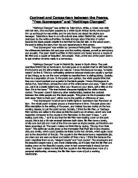After the scorpion has bitten the mother, the peasants make effort to “paralyse the evil one”. In this case, the Evil One is the scorpion. The peasants believe that creature’s movement make the poison move in the mother’s blood. They also think that the suffering of the mother may cleanse her from her sins in her “previous birth” and her “next birth”. The poet's father normally does not share such superstitions as he is described as “sceptic, rationalist” and believes in being practical. But he is now worse than the other peasants, as he tries “every curse and blessing” as well as performing his practical beliefs such as pouring paraffin on the mother’s toe and lighting fire to it. Then, the “holy man” performs “rites” and finally, after many hours, the mother is cured; “After twenty hours it lost its sting”.
The last three lines of the poem are probably the most effective of all; this is because everyone else has been concerned for the mother, who has been in too much pain to talk (she “twisted...groaning on a mat”), but she only thinks of her children, and thanks God the scorpion has spared them.
In the poem, ‘Two Scavengers in a Truck, Two Beautiful People in a Mercedes’, the first thing you notice is that the title of the poem gives away the subject of the poem. It is obvious that the poem is about the contrasting lives of people; specifically, the rich and the poor. The poem is quite simple to understand and the poet, Lawrence Ferlinghetti tries to give you the exact image of where and when this is happening. (“downtown San Francisco”, “yellow garbage truck” and “red plastic blazers”)
The two different groups of people are coincidently stopped at the same traffic light in a position to see each other. The two garbage men are hanging onto the sides of the garbage truck whereas the “beautiful people” are in their Mercedes. The garbage men have been up since 4 a.m. are now going home but the people in the Mercedes are going off to their elegant office. The garbage men are looking down at the people in the Mercedes and are described as “dirty”. The elder of the two is described as “Gargoyle”( an ugly grotesque caricature used to decorate mediaeval churches, and ward off evil spirits) and “Quasimodo” (meaning ‘almost human’). He is also said to have “grey iron hair” and “hunched back”. The other is “about the same age as the Mercedes driver” and with “sunglasses and long hair”. The couple in the Mercedes are clean and cool; “the man in a hip three-piece linen suit with shoulder length long hair and sunglasses” and “the young blond woman so casually coifed”.
The poem moves to an vague conclusion. The two scavengers see the young couple, not as real people, but as characters in a “TV ad in which everything is always possible” - as if, that is, with determination and effort, the scavengers could change their own lifestyle for the better. But the adjective “odorless” suggests that this is a fantasy - and their smelly truck is the reality.
In conclusion, I would like to add what I think are the writer’s intentions towards the poems. In ‘Night of the Scorpion” the metaphors or similes describe what was literally present (such as the candles and the lanterns and the shadows on the walls). The poem may surprise us in the insight it gives into another culture: compare Ezekiel's account with what would happen if your mother were stung by a scorpion. We are made to think that because Nissim Ezekiel writes in a free style and conversational manner.
In conclusion for ‘Two Scavengers in a Truck, Two Beautiful People in a Mercedes’, I would like to say that the poem reflects on the primary American belief that ‘all men are created equal’ - and the red light is democratic, because it stops everyone. It holds them together “as if anything at all were possible between them”. They are separated by a “small gulf” and the gulf is “in the high seas of this democracy” - which suggests that, with courage and effort, anyone can cross it. But because the poet started this statement with “as if”, we do not know if this is an illusion or a real possibility.
Ultimately, both these poems ‘Night of the Scorpion’ and ‘Two Scavengers in a Truck, Two Beautiful People in a Mercedes’ contrast the different aspects of culture and primary views of people and communities. Each person or community have different beliefs on how to deal with various problems. In some cases, their specific customs are able to work and in other cases, they are not.







